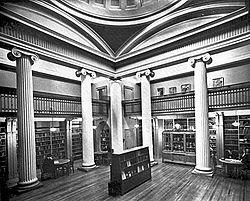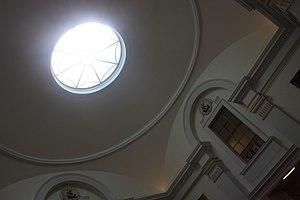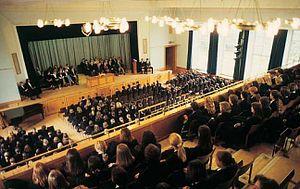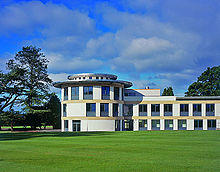| Dollar Academy | |
|---|---|
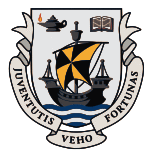 | |
| Address | |
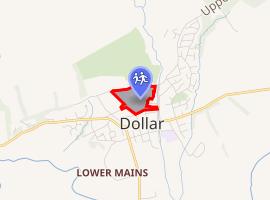 | |
Academy Place , , FK14 7DU | |
| Information | |
| Type | Independent day and boarding school |
| Motto | Juventutis Veho Fortunas (Latin: "I carry the fortunes of youth") |
| Established | 1818 |
| Founder | Captain John McNabb |
| Chairman of Governors | Professor James McEwen |
| Rector | Ian Munro |
| Gender | Coeducational |
| Age | 5 to 18 |
| Enrolment | c. 1200 |
| Houses | Atholl Mar Stewart Argyll |
| Colour(s) | Navy Blue & White |
| Publication | Fortunas (biannual publication) |
| School newspaper | The Galley Student Newspaper |
| Former pupils | |
| Website | http://www.dollaracademy.org.uk |
Dollar Academy, founded in 1818 by John McNabb,[1] is an independent co-educational day and boarding school in Scotland. The open campus occupies a 70-acre (28 ha) site in the centre of the town of Dollar in the county of Clackmannanshire, at the foot of the Ochil Hills.
Overview
As of 2020, there are over 1200 pupils at Dollar Academy,[2] making it the sixth largest independent school in Scotland. On a single campus, it is divided into three separate schools: the Prep School (Prep 1 to 5 for ages 5–10), the Junior School (Junior 1 and 2 for ages 10–12) and the Senior School (Forms I to VI for ages 12-18).
Around 90 of the pupils are boarders;[3] the rest are day pupils, either from the village of Dollar itself or from the surrounding counties of Clackmannanshire, Stirlingshire, Perth and Kinross and Fife. Almost 50% of the boarding pupils are from overseas, with the rest being British nationals.[4] The overall share of international students is relatively low at about 20% of all students.[5]
Dollar Academy has over 100 sports and recreational activities on offer to pupils after the school day and over the weekend.
Academic
Dollar Academy follows the Scottish education system, with pupils sitting National 5 examinations at the end of Form IV and Highers at the end of Form V and Form VI. Most courses in Form VI are at Advanced Higher level and a number of pupils study the Scottish Baccalaureate. All standard subjects are on offer at Dollar Academy. The school also teaches Classical Studies, Latin, Greek and Mandarin. IT training is provided to all, and Music, Art, and Drama are compulsory for Forms I and II.
Combined Cadet Force and Pipe Band
Dollar Academy's CCF (Combined Cadet Force) have won the Scottish Schools' CCF Military skills competition (formerly the Highland CCF Tactical Competition) several times in 2014, 2016, 2017, 2018 and 2019. Dollar Academy's CCF was also the first Scottish CCF to win the Welbeck DSFC Cadet Leadership Challenge in 2013 and repeated this in 2014, 2016, 2017 and 2019. The CCF First Aid team has also enjoyed great success with the cadet team winning at Scottish and National level every year since 2003. The school is also the only Scottish school in the last fifty years to win the Ashburton Shield at Bisley, winning in 2005 and 2013.
The school has two main Pipe Bands. The "A" band won the Scottish Schools CCF Pipes and Drums competition every year from 2000 to 2012 and 2014 and 2015,[6][7] as well as winning the RSPBA World Pipe Band Championships in 2010, 2014 and 2015. In 2013, the band was placed first at the last "Major" of the season, the Cowal Gathering. In 2015, the band won the Scottish, British, United Kingdom, European and World Championships,[8] leading to them being awarded the title "Champion of Champions". Additionally, the Novice, or "B" band won the British, Scottish and European Championships in 2015,[9] and was crowned "Champion of Champions"[10] as a result of their success throughout that season.
History
The school was founded by the Rev. Andrew Mylne, a leading educationalist of his day, following a bequest by Captain John McNabb, a local who was born in 1732 to a poor family, but who made his fortune at sea. McNabb captained, owned and leased out many ships over the decades and it is known that four voyages transported slaves to the West Indies in 1789-91, forty years before the Abolition Act of 1833.
The school believes that it is important to recognise this aspect of its history and pupils are taught openly about McNabb’s link to slavery in several subjects in the Senior School. In order to understand the exact extent of John McNabb’s involvement, further research was commissioned, in collaboration with leading external advisors, in 2019. To be clear, Dollar Academy abhors slavery in all its forms.
John McNabb died in 1802 and in his will he specified that the interest on half his estate was to provide “a Charity or School for the parish of Dollar and shire of Clackmannan wheir I was born.”
There were long legal delays until 1815 when the eminent educationalist Rev. Andrew Mylne was appointed Minister of the Parish by local landowner Craufurd Tait. They conceived of a great academy to educate the boys and girls of Dollar parish, and also pupils from outside Dollar, who would board with teachers. To attract pupils from outside the parish, excellent teachers would be appointed.
Architecture
In 1818, Rev. Mylne was appointed Rector of the new Academy and the top Scottish architect William Playfair was commissioned to design the building. One of the first things to strike visitors arriving at the school is the impressive Doric facade. The grand neo-classical design sets an inspirational tone for pupils and teachers alike. Visitors to Edinburgh’s Royal Scottish Academy or National Galleries might recognise his distinctive style.
Playfair also designed the fine houses for teachers and boarders in Academy Place. In 1832 an Infant School was started, accepting children from the age of three. As a result of the school’s growing popularity more accommodation was needed. Several classrooms and a large school hall were added in 1868 and a gymnasium in 1893. The Prep School was built in 1937.
There are numerous other buildings on the campus, including the Dewar Building for science, the Younger Building for mathematics and business studies, the Gibson Building for music, the Iona Building for home economics, the Maguire Building for PE, Art and Drama. There are also several rugby, cricket and football pitches, and new all-weather surface for hockey and tennis. Sport is supported by the Boys' and Girls' pavilions, the Games Hall and the swimming pool. In 2005, the new Maguire Building was opened with facilities for Art, PE and Drama and with the circular Captain's Room for conferences and meetings.
In 2016, the Westwater Building was added, named after Pte George Philip Westwater, an FP killed in the First World War at Gallipoli. This building contains the Modern Languages department and two Economics classrooms.[11]
Boarding Houses
The original boarding accommodation was built at the same time as the original Playfair Building. These houses were situated in Academy Place to accommodate teachers and boarders. Over the years these buildings have been modernised and study bedrooms introduced. The existing boarding houses are all refurbished period buildings.
There are spaces for 90 boarders in the Academy's three boarding houses. Both weekly boarders (Monday – Friday) and full boarders are accepted.
- Argyll House – girls aged 10–18
- Heyworth House – girls aged 10–18
- McNabb–Tait House – boys aged 10–18
Though the majority of pupils do not board, every pupil belongs to a House. Originally there were five boys' houses, instituted in 1911, hence the term quint. The Quint Cup and House Cup are awarded annually at Prize-Giving. Today there are four quints:
Quints
- Atholl (Red)
- Mar (Yellow)
- Stewart (Blue)
- Argyll (Green)
Former Pupils' children are traditionally put into the same house as their father, mother, brother, or sister. The names of quints and houses were merged in 2009; previously, male quints followed the names: Castle (Atholl), Devon (Mar), Glen (Stewart), and Hill (Argyll). The fifth male quint was McNabb (purple) but this was dropped in 1937.
Traditions
Each year full colours and half colours are awarded to senior pupils for achievement in sporting or cultural pursuits. These awards merit piping on the school blazer (blue for cultural, white for sporting) and/or a distinctive blazer badge. Internationalists' Award ties are presented to pupils, prep, junior and senior, who has represented their country in sporting or cultural activities.[12] Sixth Form pupils are also given a distinctive silver tie, and prefects wear white and blue bands round the blazer sleeves.
The senior six (or top six) are the most senior prefects in the school, elected by a ballot of Forms IV, V and VI. Those with the highest numbers of votes are selected for the "College of Cardinals", who vote among themselves to elect a Head Boy, Head Girl and two deputies for each.
Two school songs were composed in 1912, but neither was officially adopted. "Here in a Fair Green Valley…" by the poet W. K. Holmes and music by Marc Anthony became the official school song sung at prize-giving each year between 1929–1993. This was then replaced by the Academy Hymn, "O God of Bethel!" until 2007, when the popularity and metaphorical significance of "Will Your Anchor Hold?" (Hymn 412) caused it to be adopted for this purpose.
Rectors
- The Rev. Dr Andrew Mylne DD (1818–1850)
- The Rev. Dr Thomas Burbidge (1850–1851)
- The Dr John Milne LLD (1851–1868)
- The Rev. Dr William Barrack (1868–1878)
- George Thom (1878–1902)
- Charles Dougall (1902–1923)
- Hugh Martin (1923–1936)
- Harry Bell OBE (1936–1960)
- James Millar (1960–1962) – Acting Rector
- Graham Richardson (1962–1975)
- Ian Hendry (1975–1984)
- Lloyd Harrison (1984–1994)
- John Robertson (1994–2010)
- David Knapman (2010–2019)
- Ian Munro (current Rector)[13]
Prize day speakers
(Before 1900 it seems there was no invited speaker for Prize-Giving. The Chairman of Governors distributed the prizes)
- 1900 Professor Peter R. Scott Lang, St Andrews, Governor
- 1901 Rev. John King, Alva, Governor
- 1902 Professor John Kirkpatrick, Edinburgh, Governor
- 1903 Rev. Joseph Conn, Tillicoultry, Governor
- 1904 Professor Peter R, Scott Lang, Edinburgh, Chairman of Governors
- 1905 Professor John Kirkpatrick, Edinburgh, Governor
- 1906 Rev. Dr James Wilson Harper, Alloa, Governor
- 1907 Sir James Dewar, FP, inventor of the Dewar Flask
- 1908 Rev. Mr McIntosh, FP
- 1909 Sir David Gill, FP, ex-Astronomer Royal
- 1910 Professor Alexander Darroch, Edinburgh, Governor
- 1911 Rev. Dr Irvine Robertson, Clackmannan, Governor
- 1912 Mr William A. Raeburn, FP, shipowner Glasgow
- 1913 The Hon. Alexander Izat, FP, C.E., C.I.E.
- 1914 Professor Peter R. Scott Lang, Chairman of Governors
- 1915 Professor Peter R. Scott Lang, Chairman of Governors
- 1916 Mr Richard Malcolm, Governor and ex-Provost of Dollar
- 1917 Professor Peter R. Scott Lang, Chairman of Governors
- 1918 Mr Samuel Pitt, FP
- 1919 Andrew H. Briggs Constable, FP, KC
- 1920 Major James Simpson, FP, Governor, J.P., D.L.
- 1921 Rev. John Boyd, Chairman of the School Management Committee
- 1922 Sir Robert Maule, FP
- 1923 Sir David Wallace, FP
- 1924 Colonel George St C. Thom, FP, C.B., C.M.G., C.B.E.
- 1925 Professor Hector J. W. Hetherington, FP
- 1926 Dr Agnes Murgoci, FP, zoologist and folklorist
- 1927 Sir Thomas Legge, FP
- 1928 Rev. John Boyd, Chairman of the School Management Committee
- 1929 Lieut-Colonel Patrick B. Haig, FP, C.B.
- 1930 Professor John Kynoch, FP
- 1931 Lieut.-Col. W. F. Harvey, FP, C.I.E., F.S.R.E., M.B., M.A.
- 1932 Mr Robert Gourlay Jardine, FP
- 1933 Major-General P. H. Henderson, FP, D.S.O., K.H.P.
- 1934 Judge William S. Coutts, FP, C.I.E., Governor
- 1935 Mr Geoffrey Heyworth, FP (Director of Lever Brothers)
- 1936 Major Donald Ross, FP, M.B., Ch.B., M.R.C.P. (Ed.), J.P.
- 1937 Rev George Blair
- 1938 Sir William Robieson, Governor
- 1939 Sir John Forbes Watson
- 1940 Rev W S Wilson, Governor
- 1941 Col Sir Alexander Russell, FP
- 1942 Very Rev Principal G S Duncan, Governor
- 1943 Rev W D O Rose MA, Governor
- 1944 Professor James M Mackintosh, Governor
- 1945 Sir W McNair Snadden, FP
- 1946 Col E C Cross, FP
- 1947 Sir Laurence Heyworth, FP
- 1948 John D Westwood, FP
- 1949 Rev Canon G. K. Sturrock Clarke, Governor
- 1950 Rev Dr J. Lynn, Governor
- 1951 Peter Norwell, FP & Governor
- 1952 Rev P P Brodie, Governor
- 1953 James A. Williamson, FP
- 1954 Alan C. Mackay, FP
- 1955 Prof. T. Erskine Wright, Governor
- 1956 Air Vice Marshal Ronald Graham
- 1957 The Earl of Mar and Kellie, Governor
- 1958 Captain J. P. Younger, CBE
- 1959 Dr T. Crouther Gordon, Governor
- 1960 Douglas Cruickshank, FP
- 1961 Dr William Parker, FP
- 1962 David Walker, Governor
- 1963 W. Kersley Holmes, FP
- 1964 Col. S. J. L. Hardie
- 1965 W. McFarlane Gray
- 1966 Dr T. L. Cottrell
- 1967 Prof. J. Bennett Millar, Governor
- 1968 George Sweet, FP
- 1969 Frank Clark, FP
- 1970 Lt Gen Sir Derek Lang; Commander-in-Chief of the Army in Scotland
- 1971 Sheriff J. Irvine Smith
- 1972 Dr Colin Miller
- 1973 Sir Charles Illingworth, surgeon
- 1974 John Webster, FP
- 1975 Prof Nisbet, FP
- 1976 Dr Crammond
- 1977 Professor Donald MacKay, FP
- 1978 Rt Rev Dr Peter P. Brodie, Governor; Moderator of the General Assembly of the Church of Scotland in 1978
- 1979 Professor A G M Campbell, FP
- 1980 Hector Munro CBE
- 1981 John Cameron of BalbuthieCBE, FP
- 1982 Roy de C Chapman, FP
- 1983 Professor Christopher Blake CBE, FP
- 1984 Sir Ian Morrow, FP
- 1985 James Miller, FP
- 1986 Dennison Berwick, travel writer
- 1987 Group Captain Eric King, FP
- 1988 Professor Struther Arnott
- 1989 Chief Constable Ian Oliver
- 1990 Janet Caird, FP
- 1991 Professor Lalage Bown
- 1992 R Macleod, FP
- 1993 C Peter Kimber
- 1994 Klaus-Jurgen Moll
- 1995 Roy de C Chapman, FP
- 1996 Norman Shanks
- 1997 Jacqueline Smith, FP
- 1998 Lt Col Derek Napier, FP
- 1999 Joanna TrollopeOBE, novelist
- 2000 Dr Andrew Cubie, FP;
- 2001 Andrew Neil, editor, The Sunday Times; chairman, Sky TV, owner, The Business, The Spectator
- 2002 Eileen Kamm
- 2003 George Reid, MSP, FP, Presiding Officer of the Scottish Parliament
- 2004 Gerald Malone MP, former Conservative Minister for Health
- 2005 Alex Salmond MP MSP
- 2006 Caroline Flanagan, President Law Society of Scotland, FP
- 2007 Professor Duncan Rice, Principal of the University of Aberdeen
- 2008 Fraser Nelson, FP, editor, The Spectator
- 2009 Johanna Boyd, FP
- 2010 Keith M Brown, FP
- 2011 Abeer Macintyre
- 2012 Sir Brian Souter
- 2013 Professor Christopher Riley
- 2014 Mr Kenneth MacDonald
- 2015 Dr Steven Greer
- 2016 Mr Mark Beaumont
- 2017 Professor John Curtice
- 2018 Rt Hon Lord Keen of Elie PC QC, FP
- 2019 Alison Baum OBE
Former Pupils
Academia and science
- John Macmillan Brown, university professor and administrator
- Sir James Dewar, inventor of the Vacuum flask
- John Archibald Watt Dollar, veterinarian to four monarchs
- George Alexander Gibson, physician and geologist
- Sir David Gill, astronomer
- William Frederick Harvey, public health expert, Director of the Central Research Institute in India, Vice President of the Royal Society of Edinburgh
- Professor Sir Donald Mackay, economist
- Matthew Hay, physician and forensic expert
- John Robertson Henderson FRSE zoologist and antiquary
- Sir Hector Hetherington, social philosopher
- Henry Halcro Johnston botanist
- James MacRitchie, Municipal Engineer in Singapore 1883–95, Lighthouse Engineer in Japan
- Sir David Wallace, CMG, FRCSEd, Surgeon
- Andrew Wilson FRSE (1852-1912) zoologist and author
Politics
- Herbert Beresford, Canadian politician
- Sir George Christopher Molesworth Birdwood, colonial administrator in India
- Lord Constable CBE, KC, Conservative politician and judge
- William Scott Fell, Australian Liberal politician and businessman
- Sir John Dunlop Imrie FRSE CBE, City Chamberlain of Edinburgh 1926–1951, First Government Commissioner of Trinidad and Tobago 1951–53[14]
- Sir George Reid, Lord Lieutenant for Clackmannanshire and former Presiding Officer of the Scottish Parliament
- Sir William Snadden Bt, Conservative politician
- Sir Frank Swettenham, first Resident-General of the Federated Malay States
- Mandy Telford, former President of the National Union of Students
- James Galloway Weir, Liberal MP and sewing machine entrepreneur
- Rt Hon Lord Keen of Elie PC QC,[Conservative Party politician] Politician and Lawyer
Media and arts
- Henry Clark Barlow, literary scholar
- Ian Hamilton Finlay, poet, playwright, artist and experimental garden designer
- Alan Johnston, BBC Gaza correspondent taken hostage in 2007
- Doreen Jones, casting director
- Fraser Nelson, journalist
- Jo L. Walton, poet
- George Henry Paulin, sculptor
- Andrew Whalley, architect
Law
- Lord Brodie, judge
- Andrew Constable, Lord Constable
- Caroline Flanagan, President of the Law Society of Scotland 2005
- Richard Keen, Baron Keen of Elie, Advocate General and Justice Minister
Military
- Sir Charles Morton Forbes, naval officer
- Colin Mackenzie, army and political officer in India
Royal or noble
- The Master of Bruce (future 13th Earl of Elgin)
- Various members of the Ethiopian Imperial Family including the nephews of Haile Selassie
- James MacArthur of Milton, Chief of Clan Arthur
- The Master of Moncreiff (future 7th Baron Moncreiff)
- Sir Arthur Bolt Nicolson, 9th Bt
Business
- David Greig, landowner
- Lord Heyworth of Oxton, Chairman of Unilever and ICI
- Sir Wei Yuk – nineteenth-century Hong Kong businessman and legislator
- Sir William Reid - mining engineer and joint author of the "Reid Report" on the state of British mining
Sport
- Jim Thompson, Scottish 7s rugby player
- John Barclay, Scottish rugby player
- Hamish Brown mountaineer and writer
- Adam Kelso Fulton, Scottish rugby player
- Cameron Glasgow, Scottish rugby player
- Rory Lawson, Scottish rugby player
- Graeme Morrison, Scottish rugby player
- Jennifer McIntosh, Rifle shooter, five times Commonwealth Games Medallist, double European Champion and two-time Olympian
- Shirley McIntosh, Rifle shooter, four times Commonwealth Games Medallist
- Seonaid McIntosh, Rifle shooter, double Commonwealth Games Medallist and double European Champion
- Archibald MacLaren, gymnast, fencing master and author
- Mike Adamson, former Scottish rugby player and referee
Miscellaneous
- Sara Mendes da Costa, voice of the speaking clock
- Tom Kitchin, Michelin starred Chef
- G. A. Frank Knight, minister, archaeological author and conchologist
Notable teachers
- Andrew Bell (1753–1832), educationalist and divine (Mathematics Master)
- Patrick Gibson (1782–1829), landscape painter (Professor of Painting)
- William Tennant (1784–1848), linguist and poet (Master of Classical and Oriental Languages)
- Prof David Laird Adams (1837–1892) (Classical and Oriental languages)[15]
- Jilly McCord (History and Modern Studies Teacher)
References
- ^ "History". Dollar Academy. Retrieved 7 June 2020.
- ^ "Our People". Dollar Academy. Retrieved 2 August 2020.
- ^ "Boarding". Dollar Academy. Retrieved 2 August 2020.
- ^ "Dollar Academy | Scotland's Boarding Schools". Retrieved 2 August 2020.
- ^ "Dollar Academy (Dollar, Scotland) - apply, prices, reviews | Smapse". smapse.com. Retrieved 2 August 2020.
- ^ Marjoribanks, Kaiya (2 July 2008). "Dollar Keep Tight Grip on Trophy". Stirling Observer. Retrieved 19 October 2008.
- ^ "Number of contest performances for Dollar Academy in 2015". The Royal Scottish Pipe Band Association. Retrieved 14 October 2020.
- ^ "RSPBA 2015 Results".
- ^ "RSPBA 2014 Dollar Academy Results".
- ^ "Dollar Academy News Article – World Pipe Band Championships".
- ^ http://www.dollaracademy.org.uk/news/776-the-westwater-building
- ^ "Dollar Academy Information for Pupils Booklet 2014–2015" (PDF).
- ^ http://www.dollaracademy.org.uk/news/2039-ian-munro-appointed-as-the-14th-rector-of-dollar-academy
- ^ Biographical Index of Former Fellows of the Royal Society of Edinburgh 1783–2002 (PDF). The Royal Society of Edinburgh. July 2006. ISBN 0-902-198-84-X.
- ^ https://www.flickr.com/photos/110960089@N08/11276544563
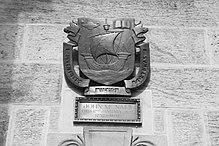
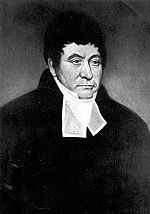
_facade_of_Dollar_Academy.jpg)
